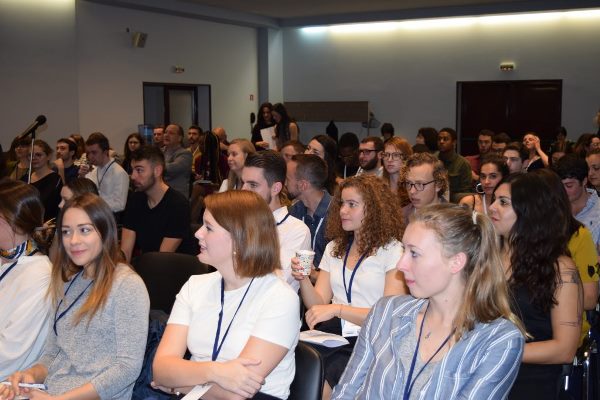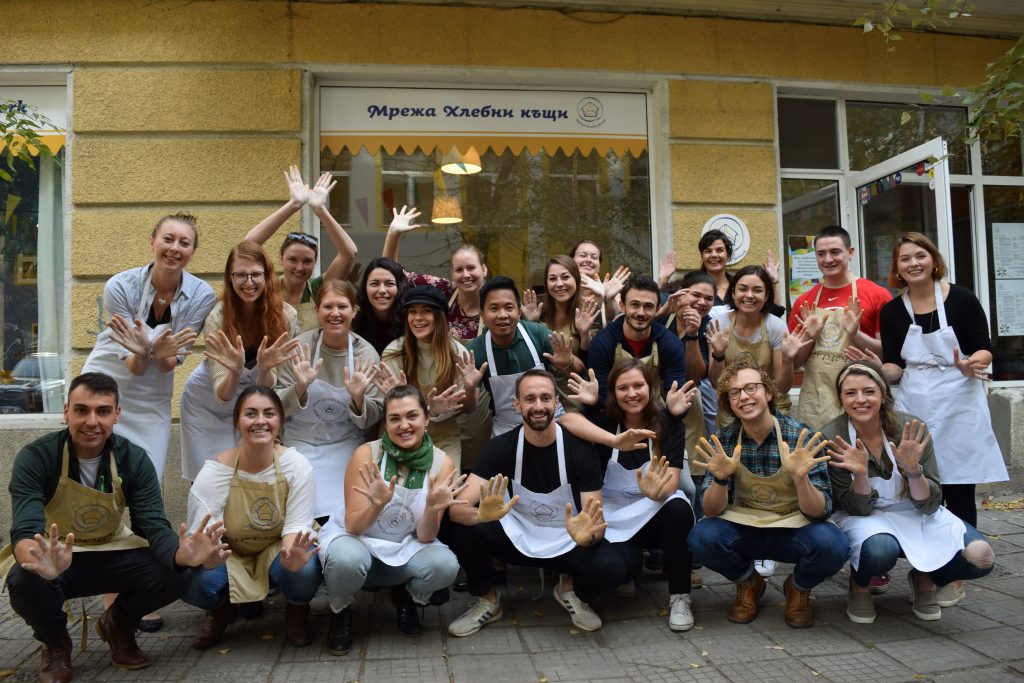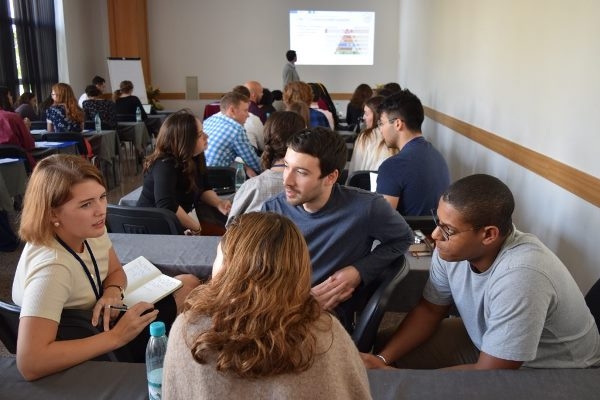Summary and Reflection on the Media Literacy Conference in Sofia
Ivan Ditmars, 2018-2019 Fulbright/HAEF Fellow
Bard College, Annandale-on-Hudson, NY, Classical Studies
*Ivan is a returning Fellow from 2017-2018
At the start of November, the thirteen Fulbright fellows placed at the Hellenic American Education Foundation were given the opportunity to join nearly seventy other English Teaching Assistants from across the Balkans and adjoining regions for a conference in Sofia, Bulgaria. With support from the US Department of State, our hosts at the Fulbright Commission in Bulgaria had crafted a seminar addressing the broad topic of media literacy. During two intense days of lectures and conversations, we were challenged to consider this topic and its bearing on our roles both as teachers and Americans abroad.
As educators we recognize that the information which we pass on accounts for only a fraction of our students’ education. In this information rich environment, access to learning does not close at the classroom doors. And so, perhaps most valuable will instead be the skills we pass on by which our students may cultivate a more sophisticated and skeptical outlook upon the data and text which pass incessantly across their screens. But such strategies must take account of the local media environment which we, as guests in countries far from home, may not be familiar with. Thus, the conference was designed not only to offer reliable techniques for evaluating media, but also to provide us with the local cultural and political contexts which must shape an effective introduction of these techniques into the classroom.
To that end, Angela Rodel, the Executive Director of the Bulgarian-American Fulbright Commission, and her team assembled an international panel of educators and media professionals who were able to address the topic through a variety of lenses. There was a wealth of lectures, and it was impossible to attend them all. Certain ones, however, resonated most strongly with our experiences in Greece. Jessica Wall, Fellow at Psychico High School, singled out the sessions with the Washington D.C. Newseum’s Vice President of Education, Barbara McCormack, during which she addressed the problems of identifying, responding to and combating ‘fake news.’ Ms. Wall writes, “I learned how to coach my students to discern opinions from facts and facts from lies, a skill of pressing importance in Balkan countries as well as the United States, where modern definitions of ‘freedom of press’ are ever evolving.” Another series of salient lectures was lead by Jen McArthur, a United States' State Department Regional English Language Officer. Amelia Dirks, also Fellow at Psychico High school, writes, “being an American whose national politics are watched on an international stage, I often face ‘hot button’ questions from my Greek students, and Ms. MacArthur offered methods of facilitating debate and conversations in class that avoided personal expressions of belief on the teachers' behalf, but instead created the opportunity for students to discuss and form their own opinions.” Finally, Ta’Mara Hill called attention to the workshop of Courtney Moffett-Bateau, a former Fulbright ETA currently working as the Diversity Project Manager for the European Fulbright Diversity Initiative. She called her lecture on diversity and inclusion within Fulbright “eye opening, informative, and resourceful.”
Interspersed throughout the weekend were enjoyable opportunities to get to know our fellow Fulbrighters and the American officials in the area. Not only were we invited into the house of the American ambassador to Bulgaria, Mr. Eric Rubin, for a welcome reception, but we were also treated to both a tutorial and a performance of traditional Bulgarian dances, tours of downtown Sofia, and even a class on bread making. The four days spent in Sofia were a major highlight of the year so far, with implications for both our pedagogical methods and our social networks through our Fulbright year and beyond.
2018-2019 Fulbright/HAEF Fellows provide additional feedback on the Media and Literacy Seminar:
Darya Kostikina
Wellesley College, Wellesley, MA, B.A., English Literature
Teachers College Columbia University, New York, NY, M.A., Education Policy
For me, the most informational part of the Bulgaria experience was hearing from Jen MacArthur, a Regional English Language Officer (RELO) at the US Embassy in Belgrade. Essentially, her job includes working (through the US State Department) to implement ESL programs abroad. As someone who has an interest in education policy--specifically concerning English-language acquisition--yet also wants to spend more time abroad, I was thrilled to find out that such a position existed, as it seems to combine my interests perfectly. Additionally, it was through her lecture that I learned about Krasher's Affective Filter. This emotional barrier to language production can actually be used as a tool to help students become more comfortable when learning a language. Learning how to "teach through an affective filter" and help students get comfortable with making mistakes in a foreign language is not only beneficial to me as a teacher, but also immensely helpful to me as someone who is striving to learn another language--Greek. These experiences, combined with the beautiful city of Sofia as a backdrop, made the conference worthwhile for me.
Kailee Ross
Ball State University, Muncie, IN
Elementary Education, concentration English as a Second Language, licensure English as a New Language
Jen McArthur made a crucial point during her Planning for Speaking Activities presentation; “It’s not about getting it perfect, it’s about getting it out.” Too many times teachers focus on perfecting our students’ word choice or grammar, when really, we need to keep in mind that it’s about the message being comprehensible, not perfect. Of course there’s a time and place for perfected speech, but ultimately we should be encouraging our students to produce as much language possible.
Jessica Wall
Pepperdine University, Malibu, CA, English Education
The Fulbright media literacy conference successfully executed on its chief goal of building cultural bridges by intentionally training English Teaching Assistants like myself how to facilitate critical thinking in response to a post-truth world. In sessions throughout the weekend, particularly with D.C. Newseum’s Vice President of Education, Barbara McCormack, I learned how to coach my students to discern opinions from facts and facts from lies, a skill of pressing importance in Balkan countries as well as the United States, where modern definitions of “freedom of press” are ever evolving. As I return to my classroom in Greece, and eventually to my classroom back in the United States, I intend to implement new lesson plans on the thorough evaluation of reported truth in order to foster a new generation of informed students on an international level.
Julia Melvin
Washington State University, Pullman, WA, Elementary Education
Although the conference was geared towards teachers at the secondary level, I found that a lot of the information and the overall goal of the conference could be adapted to fit the needs of my elementary students. Barbara McCormack, Washington D.C. Newseum’s Vice President of Education, provided us with the resources and skills that strive in teaching our students how to become smarter media consumers. It helped me to realize the importance of instilling these skills at a groundwork level in the elementary schools. Jen McArthur’s session on leading discussions on controversial topics was inspiring and made me think about how to best integrate lessons of diversity and social awareness into the classroom. Although it can sometimes be hard to find the right balance in discussing topics like this in the classroom, the importance in cultivating well-rounded and thoughtful citizens is of the upmost importance. Overall, I found that the conference as a whole provided me with a better understanding of media literacy on a much larger scale than just focusing on the state of news in the United States. It not only helped me to create ideas for my classroom but allowed me to gain a better understanding of my own media consumption and how to become a better consumer.
Kristina Widerburg
Utah State University, Logan, UT, Elementary Education with a science emphasis
My experience at the Fulbright ETA Media Literacy Seminar was not only an opportunity to build my media literacy integration skills, but it was also a chance to collaborate with other ETA from around Europe. Being able to exchange teaching experiences and reflect upon how media literacy can become integrated into the classroom was incredibly enriching. I look back at the experience, realising that although we were kept busy, we were surrounded by some amazing professionals that helped us move toward better educational philosophy and practices.
Kirstyn Walker
DePauw University, Greencastle, IN, B.A. English
Marquette University, Milwaukee WI, M.Ed Education Policy
The opportunity to meet and learn from the conference speakers allowed me to critically think about the role of media in my Greek classroom. It was amazing to collaborate with other U.S. ETAs based in the Balkans and learn more about their teaching experiences in their host countries.
Mariah Cain
University of Cincinnati, Cincinnati, OH
Secondary English Education
The Media Literacy Training Seminar hosted by the Bulgarian-American Fulbright Commission provided me with a wealth of teacher resources for designing and delivering lessons on Media Literacy. NewseumED, a free online center for Media Literacy, is particularly useful for educators of all ages. This learning platform includes over 1,000 lesson plans, digital artifacts and interactive educational tools. The Media Literacy Training Seminar helped me better understand that tackling tough issues like "fake news" calls for collaboration between diverse institutions, the experts and educators. By attending the Media Literacy Training Seminar, I have developed my skills and gained the knowledge necessary to help my students make informed decisions about media.
Kevin J. Priest
University of Utah, Salt Lake City, UT
BA, French Language and Literature; English Literature
MA, English Literature
The students I work with in the interschool library at the Hellenic-American Education Foundation (HAEF) are, for the most part, still discovering what it means to be ethical consumers and producers of media. While they're immersed in the new media landscapes of social and visual media, they are not yet adept at using media in their research. So, as a librarian at HAEF, I benefited from the emphasis on media literacy at our ETA conference in Sofia, Bulgaria because it strengthened my understanding of teaching students how to successfully and ethically use media to under-gird and bolster their learning.



